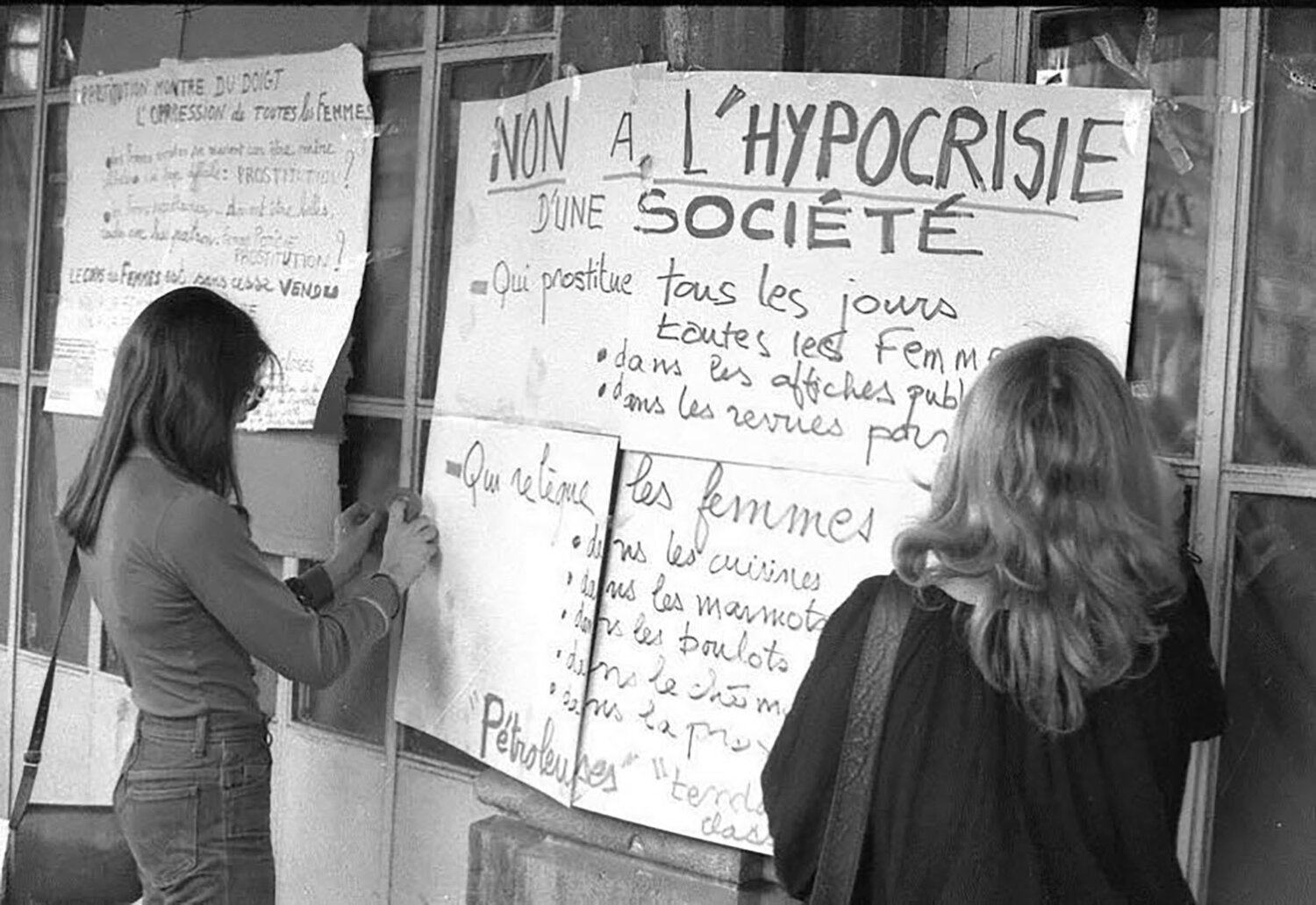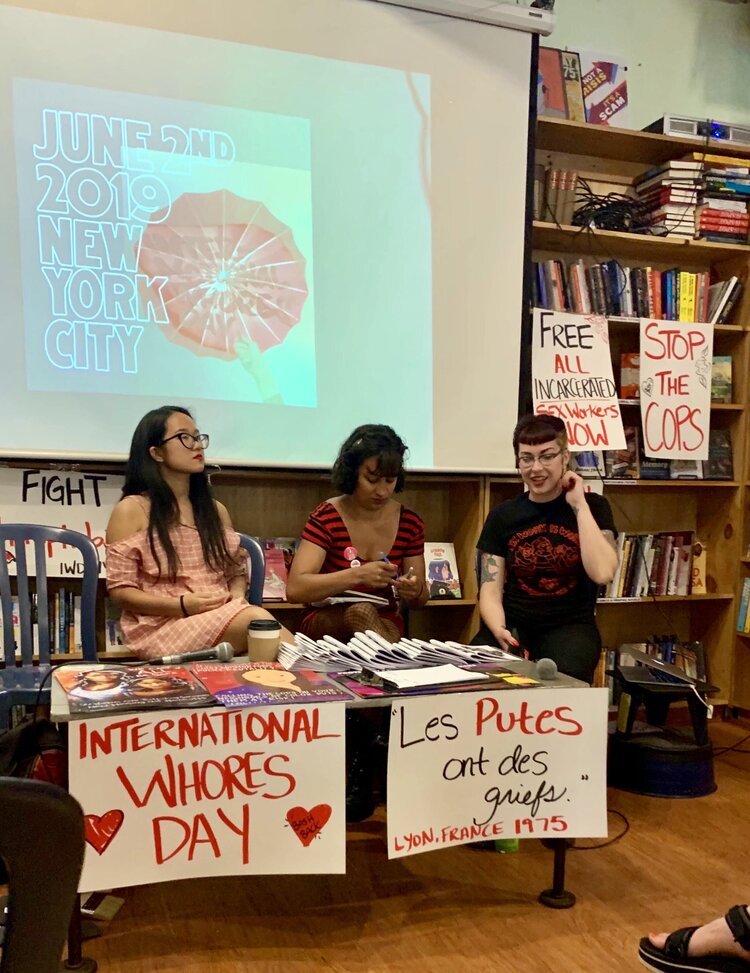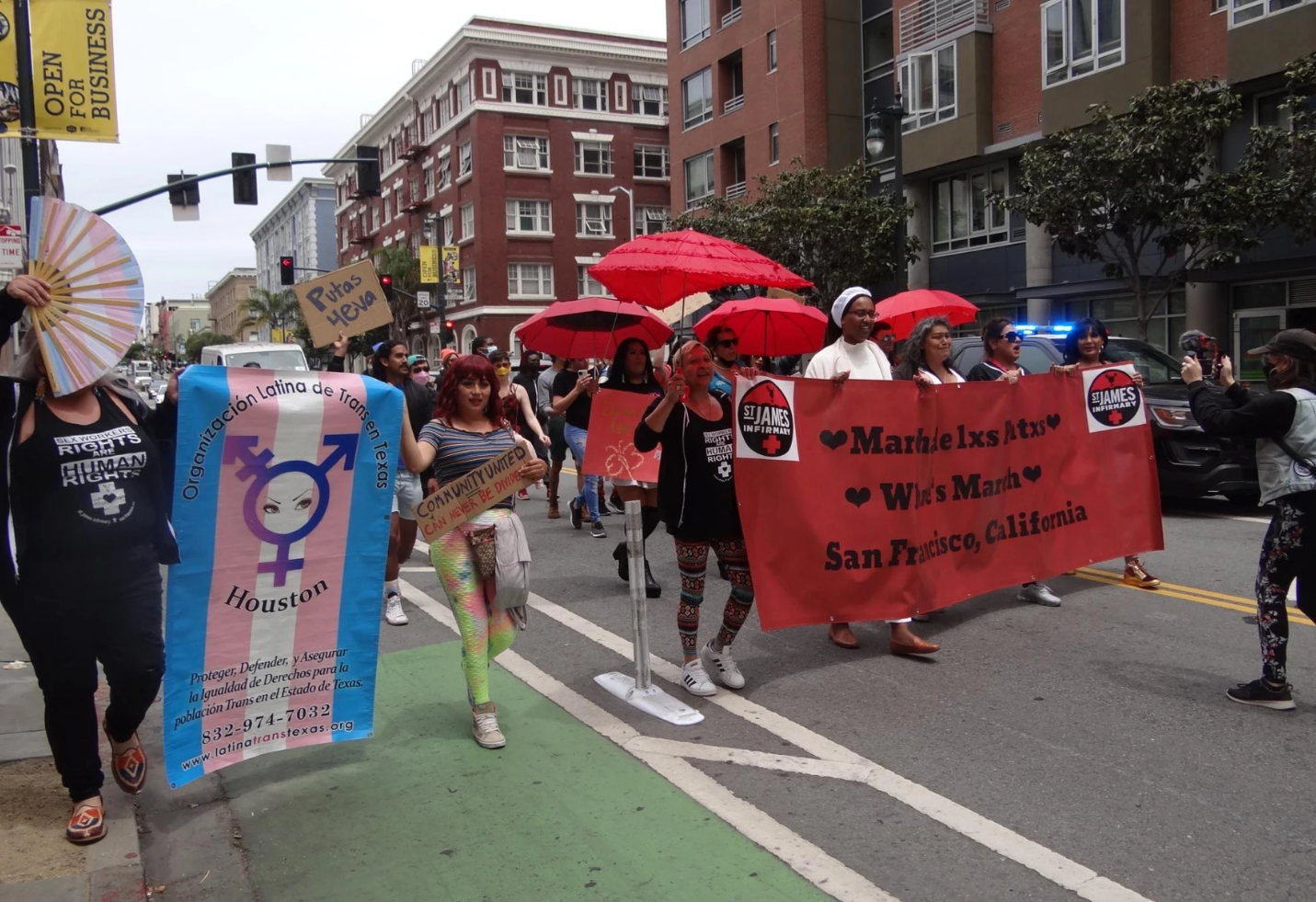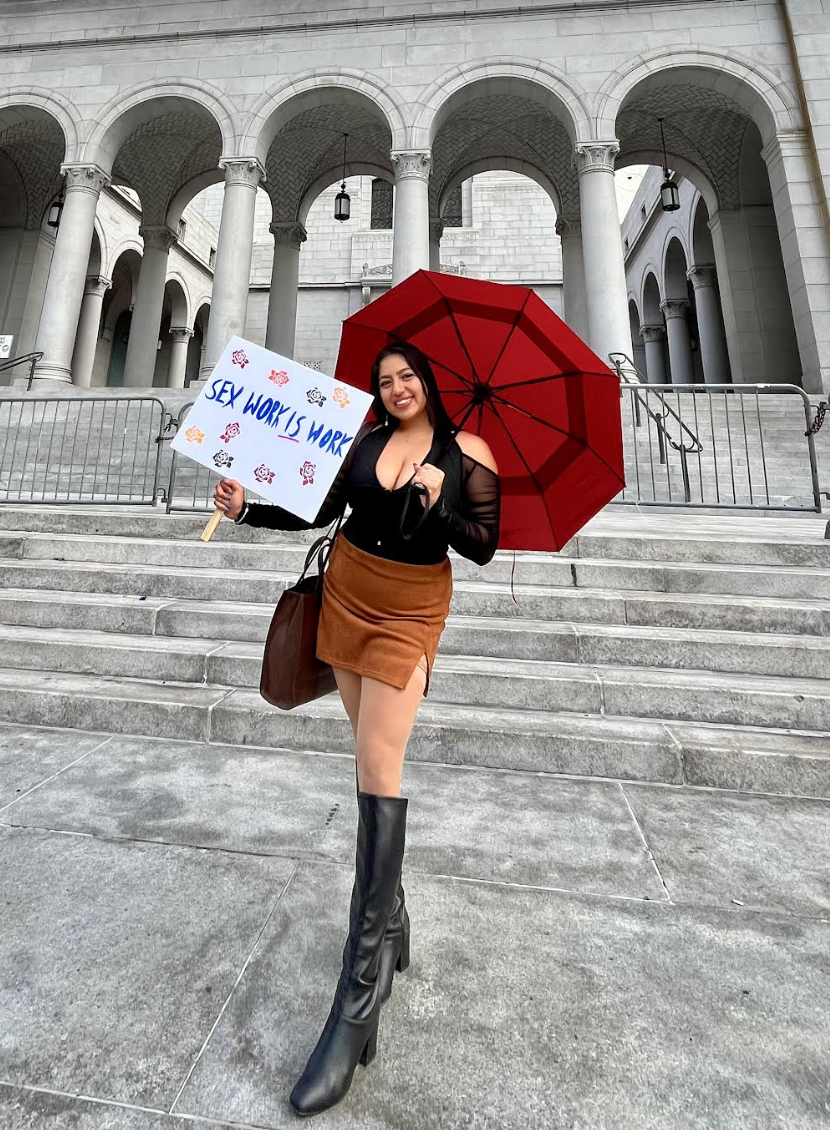This One's for the Whores: Talking Sex Work & International Whores' Day with Kim Fuentes and Rogelio Ruckus
"International Whores' Day gives us the perfect excuse to reflect on how badass sex workers are (we've got historical receipts!) and reminds us how the sustained issues and organizing efforts of sex-workers-past help frame the fight ahead towards D-E-C-R-I-M. To say, the past is present y'all."
**
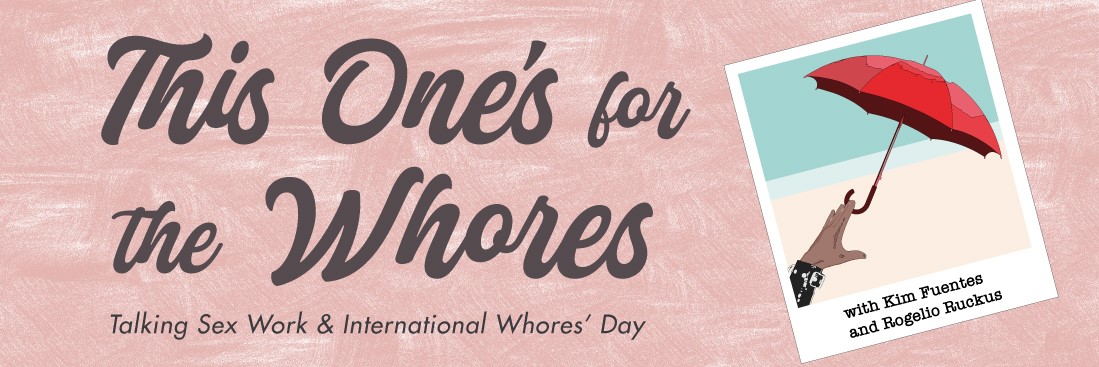
June 2nd is here. Happy International Whores' Day! A day if you will, for all those embraced under the warm glow of that big red umbrella: cammers, escorts, strippers, brothel workers, professional Dom(mes), switches, and submissives, phone-sex professionals, and of course, street-based sex workers (to name a few). This list can - and does - go on and on.
From the occupation of Lyon (that's in France y'all) to the future of our beloved interwebs, what could perhaps be more fitting than two whores talking about all things Hurentag!
International Whores' Day?
We're no whore-storians, but like most things, it feels fitting to start at "the beginning." The most popular narrative you'll find of International Whores' Day typically starts with the uprising of Lyon. In 1975, an estimated one hundred sex workers took to the street - and into the church (yes, you read that right) - to demand government accountability for the systemic police surveillance, fines, reprisals, and violence that consistently eliminated the few safer spaces and opportunities sex workers had at the time. Less known, months earlier sex workers broadcasted these concerns and demands on the boob-tube. By the end of a whopping eight-day occupation of Saint-Nizier Church, sex workers had occupied churches all over France (Paris and Montepillair to name a couple), making international news yet again! Importantly, the occupation of Lyon marks one of the many organizing efforts emerging across international sex work communities throughout the 1970s and beyond.
Like International Day to End Violence Against Sex Workers (Dec. 17), International Sex Workers' Rights Day (March 3), and Sex Worker Pride (Sept 14), International Whores' Day has since become a day to organize, gather, create, raise awareness, and celebrate sex workers across the globe.
"But!" We hear you whispering, "What does Lyon have to do with sex work today?" Our sex-positive-whore-celebrating-friend, we are glad you asked!
Today, economic, sexual, parental, and labor rights, reproductive autonomy, and systematic violence against sex workers (disproportionately against Black trans-femme people), echo calls from the distant streets of Lyon and remain among some of the central concerns of sex work whore-ganizers here in the United States.
International Whores' Day gives us the perfect excuse to reflect on how badass sex workers are (we've got historical receipts!) and reminds us how the sustained issues and organizing efforts of sex-workers-past help frame the fight ahead towards D-E-C-R-I-M. To say, the past is present y'all.
What concerns and policies affect sex workers throughout the United States today?
Sex workers are no strangers to finding creative ways to work, survive, and resist. That said, policies haven't made it any easier over the years. We still face financial exclusion, police harassment, and regulations that continue to decrease the spaces we can work in peace. It seems that from NIMBY ("not in my backyard") logic in the streets to shadow-banning in the digital sheets, at every turn, sex workers constantly face erasure and criminalization. It could take years to index every policy affecting us today; it's safe to say if it impacts your life, it impacts ours. But, let's outline a few!
Anti-trafficking regulations. Each has significantly impacted our ability to safely work. We could not be clearer, no one wants to end trafficking quicker than a sex worker. Yet, efforts by politicians and police alike to "eradicate human trafficking", have often been a ruse to introduce and enforce anti-sex-work-morality agendas and surveillance strategies that criminalize sex workers and the spaces we choose to work, instead of ending trafficking.
Here in Los Angeles, "clean up" initiatives throughout the Figueroa Corridor have become a hotbed for police to arrest sex workers. Worse, the receipts show how costly operations like these fail to actually protect or prevent sex trafficking victims, fail to prosecute sex traffickers, and instead victimize and disproportionately arrest queer, undocumented, and Black street-based sex workers.
Can you say "SESTA/FOSTA" three times fast? We know, we know, it sounds like a bad introduction to the game where you repeat a word and a monster pops out of your mirror. Trust us, SESTA/FOSTA could not be scarier and haunts sex workers beyond the streets!
Though SESTA/FOSTA was "designed" to target websites that promote sex trafficking, sex workers have suffered from the fallout of these flawed policies. Since it passed, all over the internet, sex workers have been shadow-banned or deleted without explanation (ask us how many backup accounts we have). It's important to understand that when this happens, we don't just lose pictures, we lose our livelihood: networks of support built over years, client databases, and painstakingly crafted content.
If that's not bad enough, integrated payment platforms on many of your favorite websites (cough, cough) mean our wallets are targets too! The most popular payment platforms simply aren't safe for us anymore. Locked out of accounts we've had for years, dropped from crowdfunding sites, and "debanked" it's much harder to survive at all, let alone engage in sex work. You see where we're going with this. Though shadow-bans, deletions, and site bans seem unexceptional, in the wake of SESTA/FOSTA, these daily experiences compound and limit our ability to work and provide for our families.

Stigma. Embedded in trafficking policy narratives, stigma has created a misconception that no one could ever consent to trade sex for money. So, when or if we choose to disclose our work, sex workers often must assume that people believe we have no agency to choose our work.
This creates pressure to overcompensate by opting into "happy hooker" themes to narrate our experiences of sex work: healing, empowering, easy, and fun!
(cue: Mae Martin's classic skit intro [right])
We lose the agency to be honest about our experiences (the good, the bad, and more often than not, the boring).
This does everyone a disservice. One-dimensional depictions that correlate sex work to trafficking among the general public and the pressure it creates to provide another narrative of sex work often leave little space for nuance and expose us to violence.
Among sex workers, this may leave new sex workers underprepared for the realities of the work and may cause pressure to recirculate these depictions among sex workers (Do you love your job all the time?). We lose yet another venue where we can exist sans-persona.
Of course, that's not to say that sex work doesn't have its moments! [Insert your own fun story here].
But in the same way, I wouldn't insist my barista finds their sexual liberation in grinding espresso to assess whether I should demand an end to coffee shops, sex work doesn't have to be empowering to be valid. It should, however, be protected so we can all work safely, at minimum. So what's the solution?
We said decriminalization, not legalization. Even in places where sex work is legalized, sex workers still face increased surveillance and health checks that limit their mobility and access to a life free of discriminatory practice. Most importantly, legalization protects the few and creates a separate sub-class for others. When we advocate for sex workers' rights, we must mean all sex workers. Undocumented, disabled, Indigenous, Black, and trans workers are often the first to be left out in these fights for workers' rights for the sake of protection for some.
This is why organizers are fighting for full decriminalization of sex work, as seen in parts of Australia and New Zealand. Decriminalization entails the removal of all criminal penalties on the sale and purchase of sexual acts. This would stop punishing people for doing what they can to survive and allow for more worker protections to be put in place!
I'm not a sex worker. Why should I care?
Let's just say, if you like your internet hot, you'll want to pay attention.
Bills like AB 3080 (the Parent's Accountability and Child Protection Act) in California and KOSA (Kids Online Safety Act) nationally, are at the top of the conservative moral agenda, set to cross the desk of our state representatives as we speak! Simply put, these "age verification bills" would obligate websites to require users to upload identification to access any content that may be "potentially harmful to children".
Given the vague nature of the bills and the seemingly limitless interpretations of "potentially harmful," this could mean websites for youth with LGBTQ-positive themes (content that is not harmful to children) to sites exclusively intended for dults such as, you guessed it, your beloved porn are at risk. With AB 3080 and KOSA, the slope is indeed slippery (and not the fun kind).
Though "morality" laws aren't new, we are all still bracing from the aftershocks of SESTA/FOSTA.
This will have a dramatic negative impact on adult performers in California and throughout the country. Many porn viewers will regrettably choose to not view "sexy stepsister with mommy milkers" if it requires submitting a valid photo ID (who wants Uncle Sam knowing your fetishes? Yuck). To say, we need your support now more than ever, mommy milker lovers!
Already, adult sites have seen such a huge loss of revenue in states that have implemented similar policies that they simply stop operating in those states. If these laws pass, we may very well see sites shut down altogether. Online sex workers and porn actors might lose some or all of their income overnight. We already see common websites that host providers deleting profiles (it happened to us both) which makes it that much harder for sex workers to advertise and vet their clients.
This puts us in more danger and places any website under the knife and onto the moral-chopping block. Beyond sex workers, these laws would be a massive setback to the strides sex educators have made to combat sex and sexuality stigma and increase access to queer-friendly sexual health education across the country and throughout the globe. To say, when it comes to our internet privacy rights, we should frankly, all be concerned.
Sex workers are frequently considered the metaphorical sexy canaries in the coal mines.
We're here to say, tweet tweet, friends.
Where can folks stay up-to-date on new anti-sex work policies or repeals locally? How can I get involved?
There's good news and plenty of ways to get involved! The Sex Workers Outreach Project Los Angeles (SWOP LA) has put together three "Know Your Rights" Guides to keep us all updated: SB233 (decriminalized condom possession), SB357 (decriminalized loitering with intent to commit prostitution), Arrest and Questioning, and Stop and Search. Laws vary according to your municipality so we recommend contacting your local SWOP chapter to tap into organizing efforts!

Is the closest SWOP chapter hours away? Fear not, hopeful whore-ganizer. The regulatory frameworks that criminalize sex workers are only a part of the story. The subjugation sex workers face isn't just because of our sex worker status. Police specifically target Black and trans street workers and utilize obscure laws as an excuse to profile, doxx, kidnap, assault, and persistently harass workers. That's why on top of fighting for decriminalizing sex work, we must assume responsibility for each other and push back against profiling laws that demean rather than defend us. To be clear, we're not asking for police to protect us. We protect each other. We always have.
Thankfully, there are easy ways to stay up-to-date on the latest actions, policies, and petitions right now! Organizations like Decrim Sex Work California Coalition, SWOP, and we bet others local to you are often on your favorite social media platform (go take a look, we know you want to).
Of course, we cannot forget to emphasize "International" policy on International Whores' Day.
Legalization and criminalization is still the name of the game, friend. Frameworks of legalization, like The Nordic Model (aka: the Swedish Model) of sex work continuously miss the mark and have been harming sex work communities throughout Finland, Sweden, and Denmark to name a few) through criminalizing the "purchaser" of sex (clients) and managers (a debated position we wont go into here) but not the "selling" (aka: our beloved sex worker).
As countries like Canada (even Maine in the US) adopt parts of the Nordic Model, asymmetrical "solutions" continue to be a source of significant safety issues for workers. Not only does taking out our client base subject us to unsafe working conditions, but the Nordic model reinforces anti-sex work agendas as "education initiatives" built into these models aim to end sex work altogether. Is it us, or is it starting to smell a lot like "sex work = trafficking" logic in here?
Today, it's important to remember, that the fight to abolish the prison industrial complex, protect trans lives, center disability justice, increase health care access, advocate for immigrant rights, worker's protections, Indigenous rights, and access to affordable housing worldwide is also a fight for sex worker liberation. We suggest you find your local organizations centering any of this work, our struggles are interconnected globally.
Still with us? Let's change panties, we mean, "shift gears."
Conversations about sex work can feel, frankly, so, unsexy.
How can I celebrate the whore this International Whores' Day?
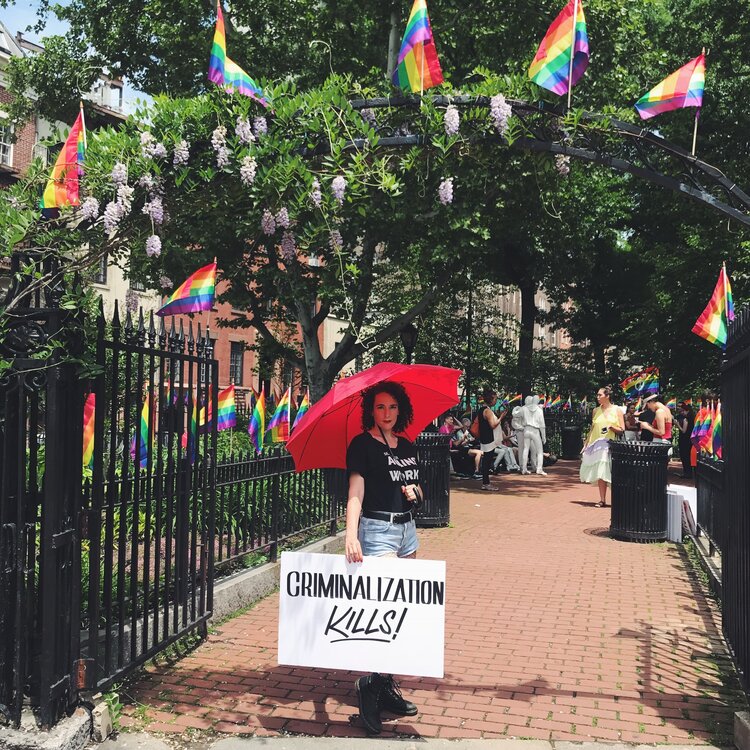 Simply, Pay. Us. First and foremost (it can't be understated), contribute to the material lives of sex workers. That's right, use our services, hire us to teach sexy classes, speak on panels, or simply, pay us for our smoking-hot existence (we deserve it). This International Whores' Day, we invite everyone to remember, there is no bigger way to help us than aiding to change our daily material lives. That sweet sweet green ($$$) is part of it!
Simply, Pay. Us. First and foremost (it can't be understated), contribute to the material lives of sex workers. That's right, use our services, hire us to teach sexy classes, speak on panels, or simply, pay us for our smoking-hot existence (we deserve it). This International Whores' Day, we invite everyone to remember, there is no bigger way to help us than aiding to change our daily material lives. That sweet sweet green ($$$) is part of it!
Support those who support us! There are plenty of sex worker-led organizations with their leather boots and stilettos in the streets working towards full decriminalization and providing vital resources, legal aid, and advocacy for sex workers. (read: they love your sweet green stuff too!) Fear not, we'll make it easy for you!
- SWOP (National Organization with state and city-specific chapters)
- Decrim Sex Work California Coalition
- Bonus points if you find one local to you!
Remember we're more than just whores! With the glamorization of sex work in the movies or TV, the sex workers in your life are tired of being your go-to guide on how to break into the fin-dom world or for our hot takes on sex trafficking. It's hard enough to have boundaries between work and our personal lives, so please talk to us about more than just our jobs! It can be easy to feel like a spectacle and not like a full human with a personality outside our personas. We are artists, organizers, parents, lovers, and students with full and worthwhile lives worth talking about beyond our jobs.
Celebrate the whore! Party with us! Sex workers O-R-G-A-N-I-Z-E. In fact, Los Angeles is home to a wide array of sex worker-friendly (and often created and hosted) parties and community events! Some of our local favorites include:
- Cruise LA - Cruisy queer event at the historic Eagle LA. Third Saturday of every month.
- SWOP LA's Sex Worker Munch - A gathering space to meet other current and former workers. Every 3rd Thursday of the month.
- Obsidian LA - Play Parties, Classes, and Munches - Held quarterly
- Folsom Street Fair - Historic annual kink, BDSM, "alternative" sexuality street fair in San Francisco. Last Sunday of September.
- Pleasure Chest Classes & Events (NYC, LA, CHI) - From anal to wax play, your favorite shop hosts sex educators with a diverse background of experiences (wink wink)!
Learn more! You know the phrase, "The more you know." Here are some other honorable mentions to support sex workers and join in the fight for decrim: books, events, resources, and more!
- Why are People into That? Talkback with Tina Horn and Rogelio Ruckus - Tuesday, June 4, 7:30-9:30pm, North Figueroa Books
- Sex Work 101 trainings hosted by SWOPLA - (book a training for your campus, organization, or community here)
- Hire a sex worker, silly.
Rogelio Ruckus, Mx. Cruise Los Angeles Leather 2020-2024 (he/him) is a Los Angeles based trans-masculine professional dominant, kink educator, and PhD student. His work centers Fetish, Sex Work, and Chicanx party community literacies, performance, and the rhetorical legacies unearthed in (re)readings of "the archive". He additionally serves behind the scenes for Obsidian LA, Cruise LA, FFillers LA, and as co-president for the infamous Folsom Street to name a few. When not organizing events or writing papers, you can find him at his favorite leather bars, elbow deep in a greedy hole, or caring for his beloved succulents. Find out more about his work on instagram: @DaddyPapiMxster
Kim Fuentes, MSW (she/her/ella) is a seasoned sex worker, PhD student, and Director of Research and Services at the Sex Worker Outreach Project Los Angeles (SWOP LA). You can find her coordinating Sex Work 101 workshops, street-based outreach, and support groups for current and former sex workers. In her free time, she enjoys funneling resources from Universities to center participatory action research with art-based methods to study and interrupt the impacts of sex work criminalization. Reach her via email at kfuentes17@g.ucla.edu or @keepinupwkim on IG!


